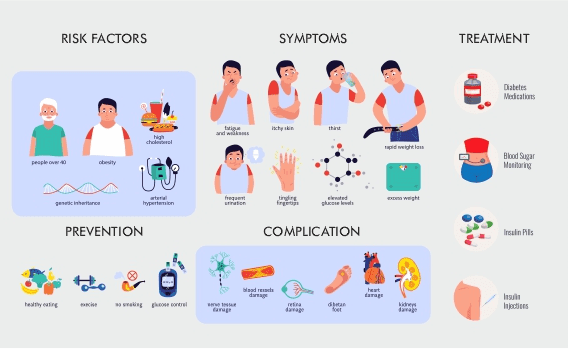Diabetes Education at Stay Tuned Sport Medicine
What is Diabetes
Diabetes is a group of conditions that result in excess glucose (sugar) in the body. This occurs either from an inability of the body to produce insulin (Type 1 Diabetes) or a lack of responsiveness to the insulin produced by the body (Type 2 Diabetes) (American Diabetes Association, 2023).
Management of Diabetes
The primary goal of diabetes management is to prevent or minimize diabetes-related health complications and improve overall quality of life. Achieving this involves several vital strategies:
Blood Glucose Control: Maintaining blood glucose levels within the target range is crucial to prevent both short-term complications (like hypoglycemia and hyperglycemia) and long-term complications (such as cardiovascular disease, neuropathy, and retinopathy) (American Diabetes Association, 2023). This often requires regular monitoring of blood glucose levels, medication adjustment, and lifestyle modifications.

Prevention of Complications: Diabetes management aims to prevent complications from poorly controlled blood glucose levels. This includes monitoring for and addressing potential issues such as diabetic retinopathy, nephropathy, and neuropathy. Regular screenings and proactive management strategies are essential (Powers et al., 2021).
Education and Self-Management: It is fundamental to educate patients to make informed decisions about their care. This includes teaching self-monitoring techniques, dietary advice, and understanding the impact of physical activity on glucose levels (Funnell et al., 2017).

Lifestyle Modifications: A balanced diet, regular physical activity, and smoking cessation can significantly impact diabetes control and overall health. These changes help manage weight, improve insulin sensitivity, and reduce the risk of complications (Australian Diabetes Educators Association, 2023).
Psychosocial Support: Managing diabetes can be challenging physically and emotionally. Mental health counselling and support groups help patients cope with the stress and emotional burden of managing a chronic condition. This support is vital for maintaining motivation and adherence to treatment plans (Funnell et al., 2017).
Coordination of Care: This includes collaboration between General Practitioners, Specialist Endocrinologists, Diabetes Educators, Dietitians, and other healthcare professionals to provide comprehensive care. Coordinated care ensures that all aspects of a patient’s health are addressed and treatment plans are tailored to individual needs (Powers et al., 2021).

What is a Diabetes Educator?
A Diabetes Educator is a specially trained healthcare professional with extensive qualifications, experience, and advanced knowledge in caring for people with diabetes or those at risk of developing it. Their role is crucial in diabetes management and patient education (Funnell et al., 2017).
At Stay Tuned Sports Medicine, our Diabetes Education services are tailored to patients’ needs, considering the type of diabetes, comorbidities, health literacy, and much more. We can assist with:
- Successful management of Type 1 AND Type 2 Diabetes for established & newly diagnosed patients
- Insulin pump therapy: commencement, change, review & education
- Insulin & medication commencement & review
- Education on the administration of insulin
- Insulin titration (Australian Diabetes Educators Association, 2023)
Charlie Dirito
Diabetes Educator

References
- American Diabetes Association. (2023). Classification and diagnosis of diabetes: Standards of medical care in diabetes—2023. Diabetes Care, 46(Suppl 1), S19-S40. https://doi.org/10.2337/dc23-S002
- Powers, M. A., Bardsley, J., Cypress, M., et al. (2021). Diabetes self-management education and support in adults with type 2 diabetes: A consensus report of the American Diabetes Association, the Association of Diabetes Care & Education Specialists, the Academy of Nutrition and Dietetics, the American Academy of Family Physicians, the American Academy of PAs, the American Association of Nurse Practitioners, and the American Pharmacists Association. The Diabetes Educator, 47(1), 89-112. https://doi.org/10.1177/0145721720986568
- Funnell, M. M., Brown, T. L., Childs, B. P., et al. (2017). National standards for diabetes self-management education. Diabetes Care, 41(1), S144-S153. https://doi.org/10.2337/dc17-S017
- Australian Diabetes Educators Association. (2023). Role of a diabetes educator. Retrieved from https://www.adea.com.au/

